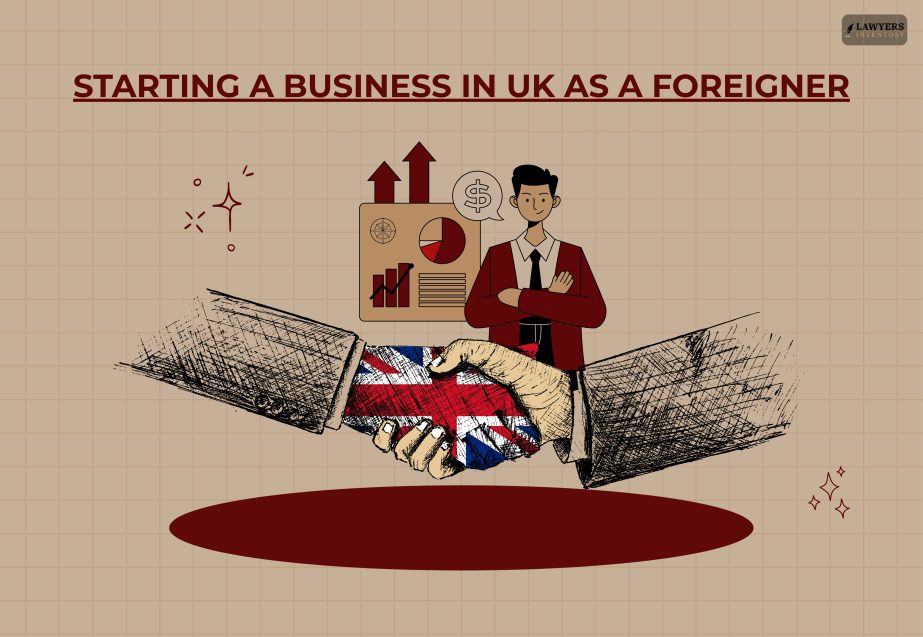
Foreign trade in the UK is more attractive in 2025. Its stable legal system, favorable business environment, access to global markets, and stable financial system make the UK attractive for foreign entrepreneurs.
Regardless of whether starting a business in UK as a foreigner, it can be a high-tech start-up, internet company, or consulting firm, having some knowledge about the legal, financial, and operating environment is required.
This handbook will walk you step by step through everything you would like to learn about opening business in UK as foreigner, from the process of incorporation, cost, banking services, operating the business, pitfalls, and expert advice.
You will find a map-sketched process for opening your UK business successfully and legally after going through this handbook.
Why The UK For Your Business As A Foreigner?
The UK is still among the most popular countries in the world for startup founders. Here’s the reason and how global creators are choosing the UK in 2025:
1. Business-Friendly Environment
UK is famous for ease in incorporation process, clear legal system, and strong protection of the entrepreneur. Entrepreneurs face minimal bureaucracy and simple reporting systems, and business for UK as a foreign citizen is not that complicated as in most countries.
2. Gateway To Global Markets
Despite having left the EU, the UK remains a hub of business and trade in the world. Strategically located, it has easy access to the European, North American, and Asian markets via efficient corridors.
Port terminals, transit infrastructure, and e-trading sites place the UK in good stead for business to be conducted.
3. Financial And Investment Ecosystem
London is also a financial center and has access to business loans, venture capital, and angel investors. Start-up and fintech-focused banks provide specially designed banking products for convenient management of cash flow and operation finance.
4. Pool Of Qualified Skills
The UK is also endowed with high-skilled populations in the fields of technology, finance, marketing, and creative sectors.
University graduates, startups, and regional professional networks can be leveraged by prospective foreign entrepreneurs to start their business at lightning speed.
5. Legal And IP Protection
The UK has good intellectual property rights and investor protection. Companies are able to buy patents, trademarks, and copyrights, which safeguards innovation and enables foreign founders to sell in safe markets.
6. Government Incentives
The UK government also provides tax relief programs, innovation grants, and funding programs, some of which can be accessed by non-British founders.
The incentives make the UK extremely attractive to technological startup companies and companies introducing new products or services.
Starting A Business In UK As A Foreigner? (Legal Frameworks & Eligibility)
Foreigners can set up business in the UK. You do not necessarily have to reside in the UK to open a company, although there are some legal requirements that need to be met:
- Residency: Residency is not necessary in the UK. Companies can be controlled from abroad.
- Directors: A sole or multiple directors are required. Foreigner can be a director too.
- Shareholders: 100% foreign owned are permitted. There is no limitation on shareholding nationality.
- Registered Office: There is UK address requirement. Virtual address can be utilized.
- Compliance Obligations: Annual accounts and confirmation statements must be filed by all registered UK companies, proper records must be kept, and similar taxes must be paid.
Understanding your eligibility and legal requirements helps in avoiding operational hiccups as well as penalty or fine.
Legal Structure Of Your UK Business
The choice of an appropriate legal structure impacts liability, tax, and freedom of action. Foreign founders’ favorite forms are:
1. Private Limited Company (Ltd)
- Foreign founders’ favorite.
- Offers limited liability protection; private property is kept separately from business liabilities.
- Permits fund raising and investor attraction.
- Is fully compatible with foreign ownership.
2. Sole Trader
- Simple to set up and run.
- No separation of business and personal risk.
- Suitable for freelancer or sole-owner business.
3. Partnership
- Joint ownership with investors or co-founders.
- Can be General Partnership (complete exposure of all partners) or Limited Liability Partnership (LLP).
4. Foreign Company Branch
- It is convenient if you already have a foreign business.
- Subject to UK branch rules and perhaps more burdensome reporting obligations.
To most foreign entrepreneurs, a Private Limited Company (Ltd) is preferable because of limited liability, reputation, and ease of fundraising.
Step-By-Step Business Incorporation Process (For Foreigners)
The following is a step-by-step guide on how to open a business in UK as a foreigner:
1. Choose A Company Name
- Must be unique and should conform to Companies House guidelines.
- Avoid identical names for companies to avoid court wrangles.
2. Appoint Directors And Shareholders
- One director may be appointed at least.
- Foreign nationals may be shareholders; not required to attend.
3. Have A UK Registered Office Address
- May be a virtual or physical address.
- Official correspondence and legal notices.
4. Prepare Essential Documents
- Memorandum and Articles of Association (declaration of company rules and aims).
- Director and shareholder information.
5. Registration At Company House
- Online registration is quick, typically 24–48 hours.
- Paper registration is slower and more expensive.
6. HMRC Taxes Registration
- Register for Corporation Tax on commencement of business within 3 months.
- Register for VAT in case of turnover over the limit.
- Register PAYE if you have employees.
7. Optional: Utilize A Professional Service
- Professional service such as Point Processing makes incorporation and ongoing compliance are easy.
Expenditures, Budget & Ongoing Compliance You Should Budget For
Foreign founders have to budget their cash so tightly:
| Expenditure | Estimated Expenditure |
| Company Registration | £12–£100 |
| Registered/Bare Office | £50–£200 per year |
| Accounting/Compliance | £500–£2,000 per year |
| Opening a Bank Account | £0–£200 |
| Legal Advice | £200–£1,000 (optional) |
| Marketing & Operation Expenses | Variable |
Ongoing Compliance:
- Annual accounts
- Filing confirmation statements
- Corporation Tax returns
- VAT filings (if applicable)
Not fulfilling filing and tax obligations will result in charges and fines.
Market Entry Strategy And Operations Considerations
Opening a business within the UK must be planned:
- Market Research: Discover consumer trends, competition, and expected local market price.
- Value Proposition: Discovery of how your product or service solves the UK market needs.
- Staffing: Employ local employees or home-based staff. Use UK recruitment agencies if needed.
- Licensing & Permits: Certain industries (finance, health, education) need the regulator’s permission.
- Marketing Strategy: Utilize online marketing, social media, SEO, and UK-specific advertising platforms to build brand awareness.
Foreign founders who perform market research and localization are more likely to be successful.
Banking, Financing, And Funding Options For Foreign Founders
Funding options for foreign founders’ follow:
- Business Bank Accounts: Large UK banks have non-resident branches where they maintain an account with supporting documents like passport and address proof.
- Fintech Alternatives: Alternative online banking alternatives like Wise, Revolut, etc., offer business accounts for non-residents.
- Venture Capital & Angel Investors: London and other UK cities witnessed startup centers for money investments.
- Government Grants & Loans: For new innovative firms or exporters.
- Private Funding & Crowdfunding: Seeders and Kickstarter can be funded from anywhere in the world.
Having the right finance ensures cash flow security and efficient operation.
Pitfalls, Expert Best Practices & Common Mistakes
Common mistakes of foreign entrepreneurs:
- Failure to keep UK company filings current.
- Underestimating the initial cost of incorporation and early business.
- Misrepresenting the legal form of liability and taxation.
- Ignoring market research and cultural facts.
- Ignoring foreign tax law and legislation.
Expert Tips:
- Engage non-resident incorporation experts as accountants and lawyers.
- Engage professional incorporation services in order to facilitate registration.
- Select tax, VAT, and corporation compliance planning.
- Protect intellectual property with trademarks and patents.
- Develop networking connections with the local group and business organizations.
Frequently Asked Questions (FAQs):
Here are a few questions and queries that others have asked on the topic of starting a business in UK as a foreigner, that might be helpful for you at the same time.
No, you can trade from overseas but have a registered office in the UK.
Start-up Visa, Innovator Visa, or Investor Visa, depending on your business model and investment strategy.
A Private Limited Company (Ltd) is typically the easiest.
Online registration typically takes 24–48 hours.
About £1,000–£5,000, depending on size and industry.
Yes, although some banks have additional verification forms or meetings to undergo.
Corporation Tax is charged on UK-registered companies.
Starting A Business In UK As A Foreigner
UK business opportunities for a foreigner in 2025 are excellent for foreign businessmen but require proper planning, legal compliance, and action planning.
From the selection of an appropriate legal form and going through the incorporation process to considering tax burden, banking facilities, and market access strategies, every step counts to be a successful businessman.
With the UK’s capitalistic culture, access to foreign markets, well-educated human resource, and financial services environment, foreign business individuals are able to impress and build their business successfully.
Avoiding errors like underestimation of cost, lack of compliance, and inadequate local market research is required for success.
With careful planning, professional guidance, and use of best practice, starting to trade as an international individual in the UK can be a highly rewarding experience.
Home or overseas on assignment, the UK is a professional, open, and rewarding place for your 2025-and-beyond business plans.












0 Reply
No comments yet.